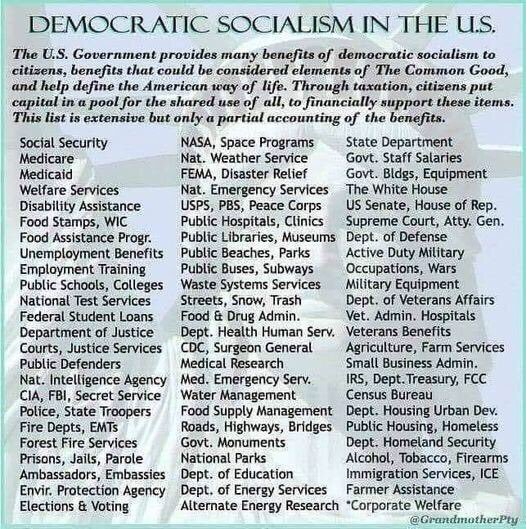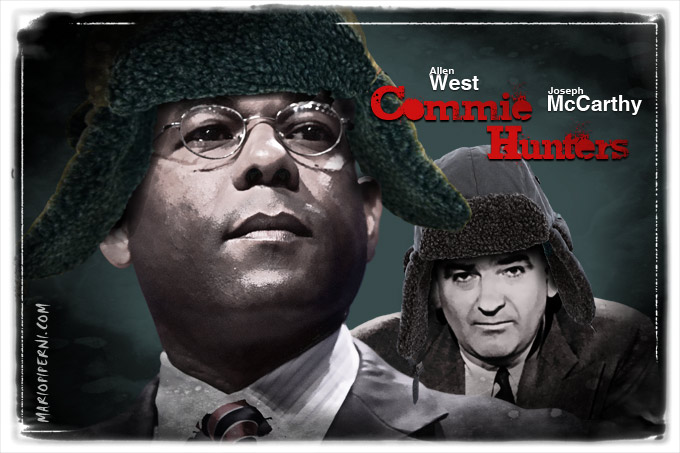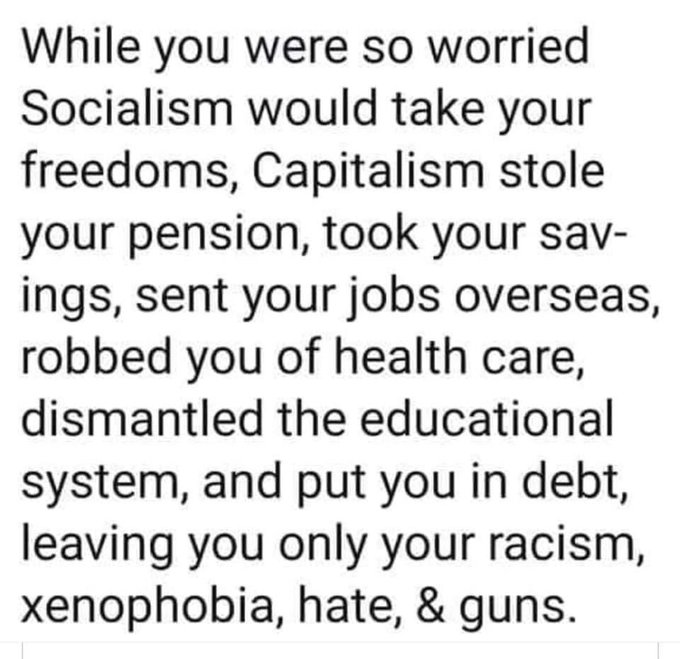Socialism
Socialism is a scare word they've hurled at every advance the people have made. Socialism is what they called public power, social security, deposit insurance, and independent labor organizations. Socialism is their name for anything that helps all people. --Harry Truman, 1952

Private capital tends to become concentrated in few hands, partly because of competition among the capitalists, and partly because technological development and the increasing division of labor encourage the formation of larger units of production at the expense of smaller ones. The result of these developments is an oligarchy of private capital the enormous power of which cannot be effectively checked even by a democratically organized political society. This is true since the members of legislative bodies are selected by political parties, largely financed or otherwise influenced by private capitalists who, for all practical purposes, separate the electorate from the legislature. The consequence is that the representatives of the people do not in fact sufficiently protect the interests of the underprivileged sections of the population. Moreover, under existing conditions, private capitalists inevitably control, directly or indirectly, the main sources of information (press, radio, education). It is thus extremely difficult, and indeed in most cases quite impossible, for the individual citizen to come to objective conclusions and to make intelligent use of his political rights. Einstein on Socialism.
Everyone’s a Socialist in a Pandemic (3/11/2020)
Bernie Sanders’s definition of democratic socialism, explained (6/12/2019)
Bernie Sanders Isn’t a Socialist (2/14/2020)
Republican Socialism:
— Andrew Harrell 🇺🇸 (@Andy4691) August 15, 2019
- Voted $4 trillion Wall St. bailout
- Voted $6 trillion endless war in Iraq
- Voted $17 Billion FossilFuel subsidy
- Voted $1.5 trillion tax cut for rich
- Voted $6 billion farmer bailout
- Voted $30 billion corporate subsidy#TrumpRecession #TrumpSlump pic.twitter.com/2do4yPZwh4
The S Word, the F Word and the Election, Guess which party is really un-American. (6/27/2019)
Wall Street loves socialism for bankers – but not for ordinary people (4/10/2019)
Total student loan debt: $1.69 trillion
— James Scott Bernie2020 (@Jscott1145) January 17, 2020
Total cost of the 2017 Republican tax cuts for corporations and billionaires: $1.9 trillion
America has socialism for the rich, harsh capitalism for everyone else. https://t.co/bnlUJ6pVEC
Socialism and the 2020 American Election (3/8/2019)
Republicans Have Been Smearing Democrats As Socialists Since Way Before You Were Born (2/24/2019)
Trump Wants Socialism for the Rich, Brutal Capitalism for the Rest of Us (2/12/2019)
What Are Capitalists Thinking? (8/6/2018)
Bernie Sanders' 12 Best Reasons for Being a Democratic Socialist (11/19/2015)
Links
Nordic Modelcommons
Economy
Privatization
Capitalism
Democratic Socialists of America
Socialist Register World Socialist
Socialist Alliance
Links
Socialist Equality Party
Climate & Capitalism
Socialism or Your Money Back
Socialist TV
Socialist.net
Socialist Matters
Andy Cox
What Is Socialism
World Socialist Party (US)
World Socialism (Canada)
World Socialism (Britain)
Monthly Review
Jacobin Magazine
Someone should remind Nikki Haley that we already have socialism...for the rich:
— Robert Reich (@RBReich) February 27, 2020
—Wall Street bailouts
—Subsidies for Big Ag and Big Pharma
—Monopolization by cable companies and giant health insurers
—Tax-deductible CEO bonuses
...all of which Bernie wants to end or prevent.

Capitalist irrationality is literally bringing an end to human civilizations on this planet. The choice is no longer between socialism or barbarism but socialism or extinction.
— Ajamu Baraka (@ajamubaraka) October 27, 2021
Socialism, American-Style (7/23/2015)
The
Rise of Anti-Capitalism (3/15/2014)
Who really benefitted from Trump's tax cuts?
— Robert Reich (@RBReich) July 1, 2019
Pfizer -->
Donations to GOP: $16M
Tax Cut Received: $39B
GE-->
Donations to GOP: $20M
Tax Cut Received: $16B
Chevron-->
Donations to GOP: $13M
Tax Cut Received: $9B
It's socialism for the rich in exchange for campaign $$$
If socialism means healthcare for all, a green new deal, k-16 free public education, good social supports, progressive taxes to pay for it, then bring it on. It works very well in Nordic countries.
The idea that the private sector should do everything is
yet another bad Republican idea. There are some things that the
market does well, and there are some that it should not do.
Monopoly capitalism is great for oligarchs who run it,
but it profits from extracting money from most people.
That's why the US has the most expensive healthcare in the developed world and yet
does not cover everyone. In a pandemic, it is a threat to public health.
Giving employers the responsibility for healthcare, pensions, vacations, family leave and other
social benefits was always a bad idea.
The market is not good for
social support:
schools, healthcare, welfare, eldercare, early childhood care, prisons, military, pensions,
vacations, sick time, ...are all shrinking, expensive or
dysfunctional in the US. This has happened
because Republicans have successfully
asserted that government cannot do anything well, have worked
tirelessly to weaken the public sector, and made it a self-fulfilling
prophecy with their relentless tax cuts.
The market, as currently constituted, does not need a lot of the people who are in the workforce. The less it pays, the fewer it uses, the more profitable it is. There is always, however, plenty of work to do. Since many people need work to survive, the government can certainly be an employer of last resort, Since the private sector strongly dislikes competition, it consolidates to drive out competitors whenever it can, and it tries to shut down public activity whenever possible. About the only activity that government can engage in, then, is for infrastructure or for the military. That is another reason we have military Keynesianism and the victory of the military/industrial complex.
It should be clear that the market is not good for the environment. Republicans, with corporate money backing, continue to deny environmental damage from green house gas pollution, nor do they recognize that we have reached peak oil and need to look at the consequences. Without considerable technological improvement, the automobile economy will become unsustainable.
Reminder of what people are calling the “radical, extreme-left agenda”:
— Alexandria Ocasio-Cortez (@AOC) July 18, 2019
✅ Medicare for All
✅ A Living Wage & Labor Rights
✅ K-16 schooling, aka Public Colleges
✅ 100% Renewable Energy
✅ Fixing the pipes in Flint
✅ Not Hurting Immigrants
✅ Holding Wall Street Accountable
Unlimited growth is not possible, and, at some point needs to be restrained. Probably human population has already grown beyond the carrying capacity of the earth. Consequences are spelled out at environment.htm The market resists, at the moment, any mechanism or inclination to handle this crisis. Cap and trade might help, but that will have to be legislated sometime in the future. Conservation will be prudent on account of runaway energy prices. 'Conservatives', as they call themselves in the US, don't believe in conservation.
The market does not work well when there are few participants, as in monopoly or even an oligopoly. We used to have anti-trust remedies, but Bush Republicans chose not to use them. US media has serious problems that might be dealt with by being sure that there are more participants (you can count on your fingers the companies that control almost everything that you see or hear.) The Bush FCC pushed mightily for further media consolidation. Bad policy, bad economics, and an information stream that probably no longer supports democracy. See media.htm
Privatization is a way of selling public assets. It takes functions from public accountability. That's what 'deregulation' is all about. It is the corporate way of getting government off its back. What you get though, as you should have seen recently, are toxic products from Asia, suspect food from factory farms, drugs that have passed FDA through bribery, workplace procedures that are unsafe, and pollution of the air and water. Particularly gruesome are privatized prisons, which are where some of the procedures that surfaced in Abu Graib and Guantanamo were developed. Also troubling are the mercenary armies, like Blackwater, that could morph into a praetorian guard. Often it is about selling off public assets.
Republicans were keen to privatize Social Security, which a huge majority of Americans oppose, but it would be a bonanza for many brokerages. Regressive Republican policies have brought back another gilded age, like 1929. Growth went to the wealthy at the expense of the less comfortable. This is symptomatic of a banana republic, particularly when the growth is funded from offshore debt. Can you estimate how much money has been used to bail out banks ?
Socialist history your teacher never told u:
— Jupiter Jones (@lvl28mage) December 4, 2019
Paul Robeson vs the House Un- American Activities committee, during the McCarthy era.
(Read by James Earl Jones)
He's speaking to Francis E. Walter dem chairman of the committee who wanted to minimize immigration (just like trump). pic.twitter.com/q3rvkgL4FK
The global marketplace is NOT a level playing field. Where the US has laws against sweatshops, child labor, pesky environmental laws, many other countries do not. That explains some of the motivation to remove jobs from the US to really low wage countries. (Disney was paying too much in Haiti, so they moved their factory to Asia. http://ihscslnews.org/view_article.php?id=67 ) This is the point at which we want to start talking about healthcare. GM moved its small car manufacturing to Korea, and of course they now say that health care for their employees is unaffordable. All of their union employees were bought out. Solves that problem.

Formerly, did you try getting health insurance from the 'free market' ? How did that work out ? Any pre-existing conditions and they wouldn't take you. Do you comparison shop for a medical or dental procedure ? Do you get full information about outcomes at your local hospital ? Can you have a free market in healthcare without such things ?
If you watched '60 minutes' news program on Sunday, you might have seen a group that normally works in third world countries set up a medical facility in a southern state, and they were overwhelmed with crowds that waiting for service. In an affluent country like ours, that's disgusting. Among developed countries, universal public health care is the norm. It works well, and is not near as expensive as ours. Ours is rationed by price, excluding a large fraction of the population. Its outcomes are not too good either. Pharma is doing very well though. Privatization does not work well for health care. See healthcare.htm
The Constitution, remember, is
also to "promote the general welfare" and the functions that are
best served by the public sector include health care, education,
and vigorous regulation of the marketplace. Those bank bailouts are
going to cost taxpayers plenty. (No, I don't think our public
health is going to improve anytime soon, but there is considerable
risk in that because sick people that are not identified may
become a problem for everyone.) There is such a thing as a
common good, it seems that Republicans don't care to recognize it
though.
The best economy is a mixed one: the private sector should do what it does best, and the public sector likewise. As for health care, recent history demonstrates dramatically that the private sector cannot handle the problem. The insurance companies should be out of the loop, and a single payer system implemented. (I know, it's not going to happen, but the system will continue to be inferior.) The Scandinavian countries are doing a much better job of taking care of their own, AND they are contributing their share to international aid. (See these comments on Norway, Finland and Denmark. Denmark is rated the happiest country in the world. ) Results matter.
See this also.
2016 was a referendum on Establishment vs Non establishment.
— Tania Singh (@TwinklingTania) November 11, 2019
2020 will be a referendum on Socialism vs Fascism.
What do you pick America?
The Empire Files: America's Unofficial Religion, The War on an Idea
"Socialism is a scare word they have hurled at every advance the people have made in the last 20 years... Socialism is what they called social security... Socialism is their name for almost anything that helps all the people.”
— Robert Reich (@RBReich) November 8, 2021
—Harry Truman, 1952 pic.twitter.com/xOzzfapbyy
Is Obama really a Socialist ?
Adapted from Matthew Rothschild's note Matthew Rothschild is the editor of The Progressive magazine
I got an e-mail from a group called 21st Century Democrats, bemoaning the fact that a recent poll shows that 55% of likely voters said that the word "socialist" describes Obama and his policies.
Obama should have pressed for single-payer national health care.
Obama should have nationalized Citicorp and Bank of America, rather than bail them out.
Obama should have favored breaking up the rest of the big banks so they couldn't destroy our economy.
Obama should have forced any banks taking federal bailout money to freeze foreclosures for at least a year and freeze interest rates on mortgages and credit cards.
Obama should have proposed redistributing income from the wealthy to those who really need it by raising the marginal income tax, and the capital gains tax, and the estate tax.
Obama should have proposed a transaction tax on every stock sale so as to curb speculation.
Obama should have proposed raising the minimum wage to $10 an hour, as Ralph Nader has proposed.
Obama should have replaced Ben Bernanke at the Fed with Nobel Prize-winning economist Joseph Stiglitz.
Obama should have come out for democratizing the Fed, as Dennis Kucinich has recommended.
Obama should have proposed a public works program to put every American who needs a job to work.
Obama should have ordered every federal building to be installed with a solar panel, and almost every car in the federal fleet to be a hybrid or electric car.
Obama should have proposed opening federal grocery stores in areas that are food deserts.
Obama should have addressed the cruel problem of poverty in America.

Obama should have proposed 12 months of paid maternity and paternity leave, mandatory paid sick leave, and federal child care.
Obama should have advocated the nationalization of the armament companies, as Sen. Robert La Follette did back in 1924.
No decent socialist would have implemented policies that have left unemployment at over 9 percent and foreclosures at record heights.
No decent socialist would have let the banks get off so easily.
No decent socialist would have been caught dead praising the CEOs of Goldman Sachs and JP Morgan Chase and justifying their obscene salaries the way Obama did. ("I know both those guys; they are very savvy businessmen. I, like most of the American people, don't begrudge people success or wealth. That is part of the free-market system.")
No decent socialist would have left the health insurance industries in the driver's seat.
No decent socialist would have empowered a panel to advocate the cutting of Social Security, Medicare, and Medicaid.
No decent socialist would have expanded the war in Afghanistan, a hopeless war being fought by the sons and daughters of America's working class.
So, no, Obama isn't a socialist. Not even close.
But we'd be a lot better off in this country if he were.
That's funny. Jamie Dimon seemed fine with corporate socialism when his bank got a $416 billion bailout from American taxpayers. https://t.co/KYhvG2kVvt
— Bernie Sanders (@BernieSanders) January 22, 2020
Bibliography
TIME FOR SOCIALISM, Dispatches From a World on Fire, 2016-2021 By Thomas Piketty
We Own the Future edited by Michael Kazin, Kate Aronoff, and Peter Dreier
The S Word: John Nichols
Anarchism, Daniel Guerin Introduction by Noam Chomsky
Fully Automated Luxury Communism by Aaron Bastani,
Why Not Socialism: G.A. Cohen